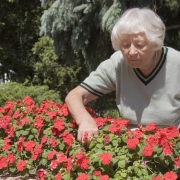Rheumatoid Arthritis Awareness Day in Assisted Living
Rheumatoid arthritis affects people of all ages — from teens and young professionals to elderly folks in assisted living facilities. This condition affects numerous joints in the body, making day-to-day activities more difficult and painful and eventually downgrading one’s quality of life.
Fortunately, while rheumatoid arthritis currently has no cure, there are numerous ways to properly manage its symptoms and limit its overall impact on the patient.
Rheumatoid Arthritis Awareness Day | What is Rheumatoid Arthritis?
Rheumatoid arthritis, (also called RA) is a type of autoimmune disease. This means that the body’s immune system mistakenly identifies its cells as foreign matter and eventually attacks it. This attack causes inflammation to the target tissues and/or organs and, over time, causes a significant amount of damage.
In the case of RA, the inflammation mostly occurs in joints but can also take place in the eyes, lungs, kidneys, and heart.
Joint stiffness is one of the most common symptoms of rheumatoid arthritis. This usually lasts longer than 30 minutes, so it’s easy to single out from the normal stiffness that occurs after sitting or standing still for a long time. Aside from getting stiff, joints can also develop swelling and pain, accompanied by a low-grade fever and appetite loss along with a general feeling of malaise.
Over time, patients can develop joint deformity, become unsteady while walking, and eventually experience mobility loss.
Rheumatoid Arthritis Risk Factors
As mentioned above, anybody can develop rheumatoid arthritis in their lifetime. However, several factors can put you at a higher risk. One such factor is genetics; if you have a family member with RA, you most likely have a higher chance of developing this condition as well.
Your lifestyle can also play a huge role. Studies have shown that smoking, eating a lot of salty, oily, and overly processed foods, and experiencing too much stress can put a person at a higher risk of developing RA.
Low testosterone and high estrogen levels can likewise contribute to the development of this condition, which explains why women are two to three times more likely to develop RA than men.
Those who have developed previous infections are also at a higher risk of getting rheumatoid arthritis. This comes from the fact that, during an infection, some parts of the immune system lose their ability to deal with pathogens, triggering it to produce new antigens that cause the body to become overactive and target its cells.
Top Assisted Living Friendly Exercises Rheumatoid Arthritis for Pain
Exercising regularly is one of the best ways to manage the symptoms of rheumatoid arthritis. Working out might seem counter-intuitive at first, especially when you feel too sore and too tiresome to move, but it helps relieve pain and reduce joint stiffness.
Many exercises can help manage RA, and most of them are simple and easy enough to be performed in assisted living facilities. One example is stretching, which helps improve flexibility and increase range of motion. Hand exercises are also greatly helpful since rheumatoid arthritis can minimize grip strength and make wrists and hands painful to use.
Yoga, tai chi, and even simple walking can improve balance and reduce stress levels and should be added to RA-related exercise routines for patients who are well enough to tackle these activities.
Dealing with rheumatoid arthritis isn’t a walk in the park. Fortunately, patients with this condition can take numerous steps to effectively manage their symptoms.
Here at Richmond Senior Living, we have a team of certified, fully trained, and experienced professionals who care for our assisted living residents with RA and help them manage the pain and discomfort they feel. Learn more about our team as well as the solutions that we offer by clicking here!
Richmont Senior Living is proud to serve Ashland, NE and the surrounding cities: Memphis, Springfield, South Bend, Greenwood, Murdock, Waverly, Murdock, Ithaca, and Chalco









